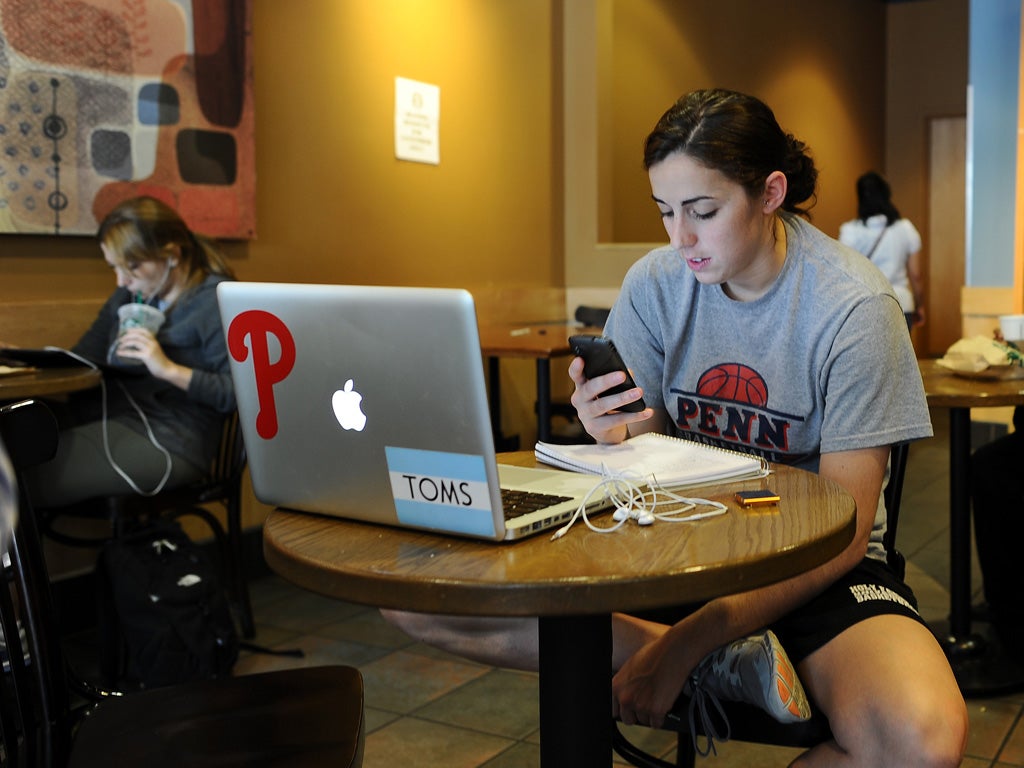The Google Glass generation: In our shiny new digital world are we increasingly terrified of being alone?
How making an impact online might be less about connecting and more about disconnecting

Your support helps us to tell the story
From reproductive rights to climate change to Big Tech, The Independent is on the ground when the story is developing. Whether it's investigating the financials of Elon Musk's pro-Trump PAC or producing our latest documentary, 'The A Word', which shines a light on the American women fighting for reproductive rights, we know how important it is to parse out the facts from the messaging.
At such a critical moment in US history, we need reporters on the ground. Your donation allows us to keep sending journalists to speak to both sides of the story.
The Independent is trusted by Americans across the entire political spectrum. And unlike many other quality news outlets, we choose not to lock Americans out of our reporting and analysis with paywalls. We believe quality journalism should be available to everyone, paid for by those who can afford it.
Your support makes all the difference.In the past few days smartphone wars have increased, fuelled by the announcement of the Galaxy S4.
Last week saw the unveiling of Google Glass; a groundbreaking product available later this year. Our gadgets are always with us - today as a handset, tomorrow as eyewear. Yet in all of our digital connectivity have we lost the art - and the elixir - of being alone?
Solitude is dreadfully unfashionable. To spend an evening by oneself is to admit social defeat à la Bridget Jones. Social media has fuelled this connection addiction. Attachment, not detachment, is the must have item this season and being alone has been relegated to the closet as an awkward fashion of yesteryear.
Life used to have natural pauses; standing in queues, riding the Tube, lying awake in bed. Now we fill each hiatus with screens and status updates; not bad activities in themselves, but gone are the moments to reflect. Thanks to mobile technology we need never be alone again.
I'll be the geek camping outside the shops all night to get my hands on Google Glass when it goes on sale. But alongside my happy immersion in technology I rely on my dear friend solitude and her comrade, silence. My first interaction with these powerful twins was an unlikely one. On a scorching summer day, crammed into a mini bus with the other sixteen year olds from my girls' school, a compulsory RE trip took us to the local Benedictine convent. We invaded the prayer-soaked space, a loud army of short skirts and chewing gum. To the girls' horror our final activity that day was joining the Sisters in ten minutes of silence. My classmates attempted to read Just Seventeen under the pews, but I slipped off to a quiet corner and encountered a peace and spaciousness that forever marked me.
From that day onward I've chased solitude and silence across the globe; from Merton's Abbey in Kentucky, to Fairacres convent in Oxford, St Cecilia's in Nashville, and the cloister of St Francis in Italy. In the silence my deepest fears about needing to achieve and to matter have been unearthed. Solitude, I've found, is not so much absence but a life-shaping presence with the power to re-calibrate and transform.
Lately, my favourite TV show has become Charlie Brooker's Black Mirror. It's a chilling reminder that many of us increasingly exist for an online, semi-invisible crowd, swayed by their praise or criticism. Simultaneously Black Mirror demonstrates the positive potential technology has to increase our abilities, productivity and reach. Whether you like or dislike Brooker's programmes, one thing is certain - the tools in our hands are becoming evermore powerful and this calls for greater responsibility and intentionality.
In this digital age I believe solitude and silence are not just pleasant ideals but a crucial survival kit, both individually and societally. They are tried and tested in resetting our moral compass. The raising of children showcases this; most of us in our early years were told to "go and sit quietly on your own and think about what you've done". They also have an established place in the prison system where solitary confinement is used as a go-to tool for reform. In solitude our vision becomes clearer - we reconnect with who we are and what really matters.
Clearly personality plays a part in our attitude toward being in our own company, as does a tendency toward melancholy, or suffering from the grip of depression. For some, being alone is unadvisable on these bases. Yet for many who don't suffer any danger from solitude, it still ranks as one of societies biggest phobias. Most of us are terrified of it. Conversely, many of us long to be a fresh, creative voice in the world. The very thing we fear may be the key to this dream; separation from the pack is often the bringer of the clarity and creativity we desire.
Thomas Merton said the goal of his time alone was "clear vision, clean of the world's smoke"; how fitting for a visual, Google Glass generation. Someone once wittily remarked about the Internet "Never has so much been said about so little by so many". When permanently immersed in the noise, we risk merely echoing it back. By withdrawing we become unique; above the din we hear the overtures of a different symphony and can sing its beauty back to a cacophonous world.
Join our commenting forum
Join thought-provoking conversations, follow other Independent readers and see their replies
Comments